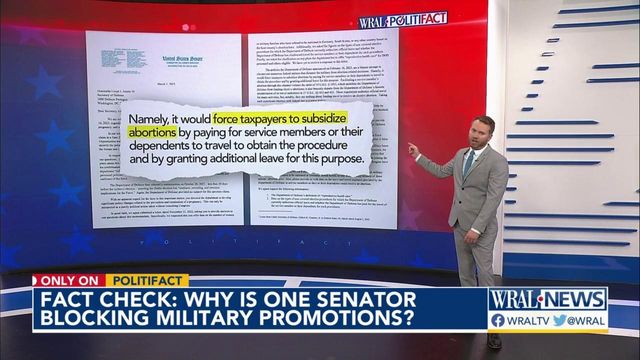Fact check: Why is a Republican senator blocking military promotions?
Senate Majority Leader Chuck Schumer, D-N.Y., has criticized procedural maneuvers launched by Sen. Tommy Tuberville, R-Ala., that have held up promotions for some senior military officials.
Schumer said in a Mar. 28, 2023, Senate floor speech that Tuberville is "blocking the routine promotion of 160 general and flag officers because he objects to women within the military getting access to reproductive care."

We asked Schumer’s office to explain the senator’s reasoning but got no response.
We found that Schumer has a point, but glosses over some nuance.
Usually, promotions of high-ranking military officers, including generals, is one of the Senate’s least controversial duties. But for months, Tuberville has worked to hold up promoting them to protest a new Pentagon policy that allows service members up to 21 days of leave to obtain an abortion or fertility treatments. They would also be reimbursed for travel costs.
The policy was implemented earlier this year, half a year after the Supreme Court overturned Roe v. Wade. The court’s decision cleared the way for states — including some with major military bases — to ban or substantially restrict access to abortion.
Tuberville expressed concern about the Pentagon’s new policy as long ago as last year, when it was just a proposal.
On March 1, after the policy was implemented, Tuberville wrote a letter to Defense Secretary Lloyd Austin in which he said the policy would "force taxpayers to subsidize abortions by paying for service members or their dependents to travel to obtain the procedure and by granting additional leave for this purpose."
As recently as April 25, Tuberville, joined by Sen. Mike Lee, R-Utah, successfully blocked the chamber from taking up the promotions.
"I warned Secretary Austin that if he did this and changed this, I would put a hold on his highest-level nominees," Tuberville said from the floor. "Secretary Austin went through with the policy anyway in February of this year, so I am keeping my word."
Schumer’s statements make clear that Tuberville’s efforts to block the promotions stem from his position on abortion.
However, Schumer’s description — that Tuberville "objects to women within the military getting access to reproductive care" — is more expansive than what Tuberville has said.
Tuberville’s office told PolitiFact New York that Tuberville’s action is "specifically related to taxpayer-funded travel and time off for elective abortions" and that he "does not object to existing federal statute and longstanding (Defense Department) policy that provides for abortion in narrow circumstances. Sen. Tuberville is objecting because the DoD is circumventing the law and the role of Congress."
Tuberville’s office said these procedural moves aren’t meant to keep service members stationed in states where abortion is legal from securing abortions.
Finally, Schumer’s use of "reproductive care" is overly broad. According to federal law, reproductive health services refer not only to the "termination of a pregnancy" but also actions "relating to pregnancy" that are provided "in a hospital, clinic, physician’s office, or other facility."
Tuberville’s office says he is not blocking the promotions to prevent pregnant women from securing those services.
PolitiFact ruling

Schumer said Tuberville is preventing military promotions "because he objects to women within the military getting access to reproductive care."
Tuberville’s procedural blockage targets a new Pentagon policy that allows service members up to 21 days of leave to obtain an abortion or fertility treatments, with reimbursement for travel costs.
However, Schumer’s description of Tuberville’s intent is overly broad. Tuberville’s holdup of nominations is not intended to block service members from getting an abortion if they are stationed in states where abortion is legal, and it is not intended to block "reproductive care" beyond abortion, such as pregnancy care, fertility treatments or contraceptive services.
We rate the statement Half True.












